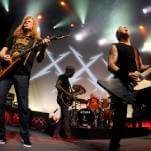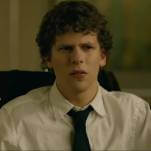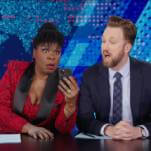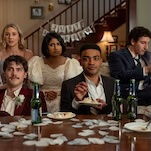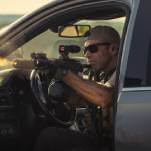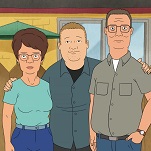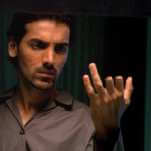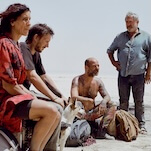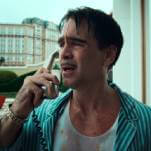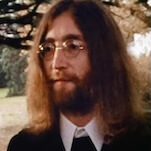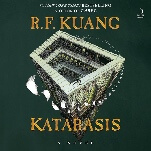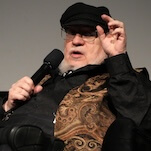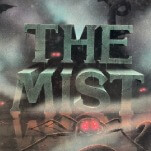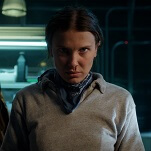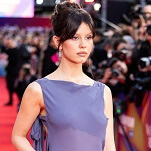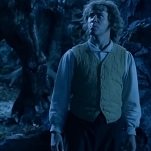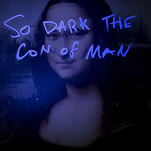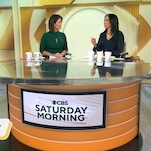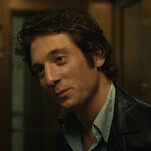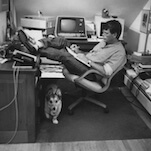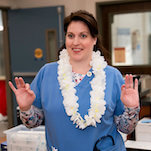Bemoaning reality television’s lack of authenticity is the new version of kvetching about MTV no longer airing music videos. In both cases, producers and networks have come under criticism for content that belies their branding. But in 2013, the term “reality” is about as incisive as “alternative rock.” The tag applies to docu-soaps, cooking franchises, talent competitions, and celebrity vanity projects. The actual method for writing and producing a traditional reality franchise—i.e. several relative strangers coexisting under a microscope—has become incredibly sophisticated, mirroring journalistic storytelling approaches and influencing scripted fare.
Troy DeVolld is particularly qualified to articulate those distinctions. Having initially moved to Los Angeles more than a decade ago to pursue screenwriting, DeVolld took a slight detour into reality, working his way up from dailies coordinator on The Osbournes to story editor for The Surreal Life, story producer for The Bachelor and Dancing With The Stars and, ultimately, a lengthy stint as co-executive producer of VH1’s phenomenon Basketball Wives.
Going a bit wider, there’ll be some sort of outline written before you go to the field that’s just based on information you have about the people who are out there—what you think they’re going to do, what’s important with their lives, what kind of things you want them to be able to have conversations about with each other. And when you go out in the field, sometimes that changes based on where they take you, but at least you have a launch point. There are reality shows that are slavishly devoted to being on track, where you start to see things like people having arguments with each other, but for some strange reason, they’re smiling while they’re yelling at each other. It’s sort of like, “Hee hee, I’m acting.” Most of us would like to avoid that sort of stuff. The quality of the program varies. The perceived authenticity is the variable that makes the show great or suck.
AVC: Do you make sure the first episode is more table-setting until the cast is comfortable?
TDV: With most reality series that run for multiple seasons, the stories will tend to be more about situations and events in the beginning. Then, as the series develops, you get more of a personal take, because everyone starts to get comfortable with each other and the camera and realizes what will and won’t make it to air. They’re not self-governing the way they used to be.
AVC: Were the reality stars that have segued into acting careers phonier than their reality co-stars?
TDV: Not necessarily. I will tell you that when an actor decides they want to be on a reality show, oh what a terrible thing to have happen to you. Just anecdotally, there’s a major reality agent that once said something about how every season these large-cast reality shows get on the air, he starts getting phone calls from people who are like, “Yeah, I need an agent.” And they’re like, “What do you do?” “Well, I’m the chick with blue hair that’s on Big Brother.” It’s like, “But what do you do?” “I’m the chick with blue hair that’s on Big Brother,” like that’s supposed to be enough of a calling card, and it’s just not. You have to have an actual skill or talent or ability other than being yourself in order to move that forward. There are only a handful of reality personalities that really ever make it into acting. I’m happy for NeNe Leakes, but there’s a hundred more that wanted to get out of reality TV that didn’t for every one of her.
AVC: How does it differ when you’re writing a reality series around celebrities?
TDV: If you’re doing anything that involves celebrities, you have to remember not to keep them so on-the-rails that they can’t show you who they are beyond the public persona. I always go back to The Surreal Life as an example. If I had told you, “Ha ha, I’m going to put Emmanuel Lewis and Gary Coleman in a room together,” or this sort of stunt casting, like the second season when they had Ron Jeremy and Tammy Faye [Messner] in the house together, you know there were going to be arguments. And you might even say they’re predictable, because you’re casting to that end. But when you look at the first season of that show, everybody was so different, and they weren’t people who had public personas that you really felt like you knew deeply, and that’s when celebrity casting works for me—when you actually get to see who somebody is beneath who you thought they were when they came into it.
Even Dancing With The Stars does that really well. Those packages about what everybody’s real motivations are, a friend or family member stops by to see them rehearsing… I realize it’s all fairly cursory. Those packages are two or three minutes long, but you get to actually see somebody doing something that’s outside of their comfort zone and who they are. With celebrity, that’s where people screw up, because they forget to have the celebrity do anything but be themselves, and then the show’s kind of a dud.
AVC: Does the casting process already contrive a series before it’s written?
TDV: Everything has to start with a plan. When you talk about something being contrived, it’s going to loosely start with, “Okay, Thursday, we’re going to bring you and your friend together. You’re going to sit in a restaurant, and you’re going to have a conversation about this thing that’s going on with the both of you.” If that conversation turns left, you have to re-adjust everything you planned out, so it’s fairly fluid most of the way through. Duck Dynasty is a great example of something [where] you really feel like you’re seeing the hand of the producer on that show a bit more. Everyone on that show is full of bon mots and does these amazing interviews. I think there’s a one-in-a-thousand chance that those personalities are 100-percent coming up with their own material. That stuff is being fed to them, in my opinion.
AVC: How are viewers supposed to reconcile that most interviews are scripted, but the scenes themselves are just outlined?
TDV: I think it boils down to whether people are entertained. There’s a certain level of savvy that just comes with having been around reality TV for a long time. Anybody can watch reality TV and go, “Oh, well that seems a little weird,” or, “That’s going a little bit far.” People who produce it the best are people who are able to cover the scenes in the storytelling. Because audiences are more savvy: They watch more reality TV; they know more about how it gets made. It’s sort of like, in the ’80s and ’90s, there were so many behind-the-scenes specials about movies, and movies almost seemed kind of boring. I’m able to suspend my disbelief for movies. I’m also able to suspend my disbelief for reality television. So, despite whatever level of savvy I have as a viewer, or that any other ordinary television viewer would have, it boils down to whether they’re enjoying it and not how authentic that experience is for them.
AVC: The line gets especially blurred when characters fight. Do writers or producers actually instruct arguing cast members to be more or less emphatic?
TDV: Typically, there’s a producer on set, and as things start to come back in post-[production], there are times when you see somebody and you’re like, “Wow, that person seemed so much livelier in casting.” So you have the phone call that says, “Listen, you’re really closed off. You’ve got to find some way to be more expressive on this show, because you’re not the person we cast.” When there’s hundreds of thousands or even millions of dollars riding on them being open, you sometimes kind of have to force that a little bit. It’s not in a way where it’s like, “You’re going to have to get in there and start screaming and yelling at people.” It’s more a matter of, “You’ve got to be passionate about whatever it is you’re saying and believe in, and don’t be timid and hold back for the camera.” That’s almost always what it was, holding back for the camera, that you have to overcome and say, “Listen, you need to step it up a little bit and be yourself.”
AVC: But you’re not actually putting words in their mouths?
TDV: No. In a scene, I might have to say, “Can you guys please have a conversation about what happened last Thursday, because I can’t make sense of these two scenes without you talking about how you got from this point to this point; something happened off-camera.” There are certain things you’re going to have to ask for. Interview content is a little bit different, because there are some people that come in and they’re like, “What do you want me to say?” It’s like, “Well, I want you to answer these questions.” So whenever I write questions for people, I always start with the phrase, “If this is true…” because you’re going to drive the person bananas if you’re like, “So, tell me about how much you hate so and so.” Then they shut off, and they don’t want to work with you anymore.
AVC: Do you think the term “reality TV” is appropriate for the genre or holding it back?
TDV: The problem is that the term “reality television” has been used as such a broad umbrella for any one of a number of reasons. Reality television is not covered by the WGA [Writers Guild Of America], so I can remember a period of time where they were trying to apply it to game shows. [Reality] swallowed variety. It has basically become this big cloud they want to lump a lot of things into so that you can do more on unit production. I think it’s a misnomer to refer to everything as reality television, and it’s a real disservice to the people that make it. There’s a certain amount of importance to the illusion that it’s not scripted or tampered with or altered, that it’s as natural as humanly possible. But I don’t think you should be calling it reality television. There’s got to be a better name for it.
AVC: Most of it is more like improvised reality, just as improvised comedy starts with an outline but the end result is still the cast members’ own words and sensibility.
TDV: Yeah, if you watch Curb Your Enthusiasm, it’s almost constructed like a lot of reality shows are, where you have the point of every scene, the one thing somebody has to get across in that scene, and they basically say, “All right, we’re just going to go in here, and we’re going to get from A to C, and all you have to do is come up with B.” There are a lot of reality shows that are produced that way. It’s very similar to the way that a lot of that semi-improvised entertainment is.
AVC: Also, some scripted shows like Modern Family or Family Tree share reality’s scene-interview-scene structure.
TDV: Oh yeah, that device is certainly ubiquitous in the scripted universe. They’ve borrowed from reality there.
AVC: It’s also not too different from the storytelling journalists do in print or online. Conversations are constructed to be a coherent, compelling read.
TDV: Like with journalism, it’s choosing your moments, choosing what to discard, being able to rearrange that order. Timelines are a big thing in reality TV. Over the course of four months, you’re trying to find six or eight scenes that relate to each other that you can make an episode out of.
AVC: Is a “Frankenbite” another way reality shows condense timelines?
TDV: A Frankenbite, by definition, is just when you take original spoken material and you cut it into a smaller, or different, version of itself. There’s a big difference between the Frankenbiting that you’re probably thinking about most often and the Frankenbite that actually has to happen for a show. If I say, “Yesterday I went to the mall, I bought a lemonade, I rode the kids’ train, and then I bought a pair of pants,” but all I needed to know is there’s a pair of pants, I will Frankenbite it down into, “I went to the mall and I bought a pair of pants.” Because after all, a reality show’s only half an hour to an hour long, and you can’t have somebody, every time they open their mouth, take 20 or 25 seconds to relay the thought. So Frankenbiting should be for the compression of time.
When you are Frankenbiting for the purpose of making someone say something they didn’t say, then there’s a whole ethical thing that comes into play, which is you don’t want someone to say something that isn’t authentic to their character. But I could take that same sentence that says, “Today, I went to the mall and bought pants” [and say], “Well, there was a scene where she went to a boutique, and it wasn’t at the mall, and I want to set up the top of the scene. And somewhere else she says, ‘My friend at the boutique.’” I could say, “Today I went to the [cut] boutique [cut] and bought pants.” So I’m changing the location. I’m not doing anything sinister. It’s sort of mixing the spackle to hold the show together without having to redo the interviews.
AVC: Do you think you’re held to a different standard of authenticity because it’s a visual medium?
TDV: Exactly. You can’t see the ellipses in reality TV when we’re putting portions of a thought together. So many people are sloppy as bejesus about it. You just hear the shift in pitch when people are speaking.
AVC: It can almost sound Auto-Tuned at that point.
TDV: Exactly. They should have that in reality shows.
AVC: Have reality series become more or less scripted since The Osbournes?
TDV: It’s funny, because I can’t give you an answer for that. The landscape is so broad, the term “reality” is so broad, that what we have now that we didn’t have then are shows that are celebrity-driven but in odd ways. Anthony Bourdain writes his own show, so of course it’s going to be in his own voice. It feels very authentic. I would have no idea what the real sequence of events is on that thing. I don’t know how much anything changes from the source material, because there’s a singular voice that’s really coming through. With The Osbournes, I think they were very open from the beginning, and you felt their voice and who they were. And it was a surprise. Now there’s a big boom in reality shows about sports figures and other people in the public eye who, outside of their jobs, are not necessarily that interesting. They tend to fall a little bit flat. Since The Osbournes, I think we’ve discovered that the private lives of public people can be entertaining, and it’s fun to find out who they are, but take a look at Run’s House: When I was watching, it always felt like they had a very definite agenda for each one of those scenes. I didn’t feel like I was getting a terribly authentic view of what was going on with Run and his family, because it felt like it was very produced. But his personality was such that I still got the flavor of who everybody was, and it made the show not only watchable but entertaining, because the feeling that I was almost seeing someone in their natural habitat was appealing to me.




